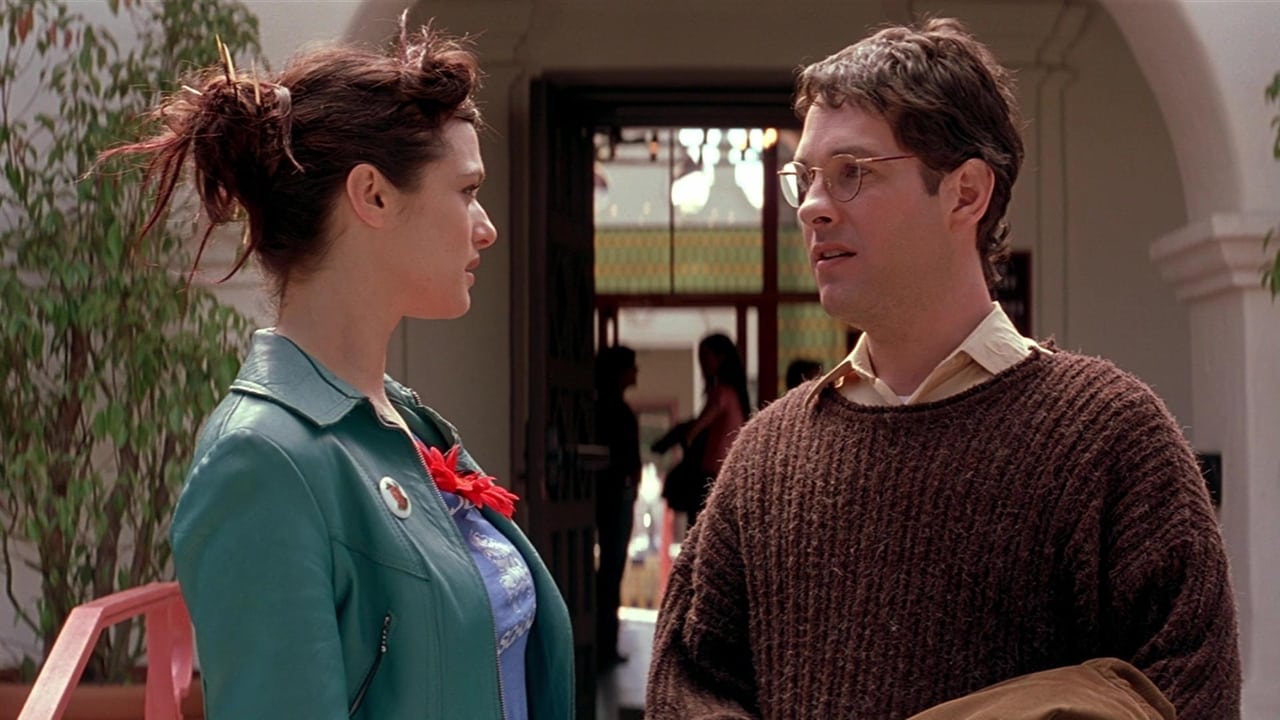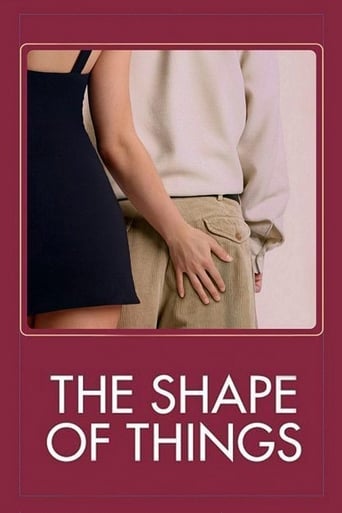

This is one of those movies that stops and you say, "You're kidding, that's the end?" Apparently, this was first a play, which shows in several overly-long scenes. But, even if I had seen this on stage, I would have been unhappy with the abruptness of the ending. I can handle ambiguous endings. In fact, many of my favorite films just sort of trail off, but this movies takes a very long time setting up an admittedly dramatic situation . . . and then just stops. Where's the rest of the story? There really should have been a more fully developed Act III or at the very least an epilogue. Since the movie has neither, it comes off as a one-trick pony, or worse yet, a cruel joke on the audience. I cannot recommend this one.
... View MoreNeil LaBute's "The Shape of Things" (based on his own play) is a brilliant, sharp and devastating study of the thin line between what some people call "art", and cruel manipulation. Rachel Weisz delivers her best performance to date as 'Evelyn', an iconoclastic Art student who seduces the nerdy Adam (a surprising Paul Rudd, showing that he has much more range than his contributions with the Apatow crew might demonstrate). She convinces him to make some major changes in his life, both physical ("You're cute. I don't like your hair", she says as they first meet in the museum where Adam works) and emotional, as she forces him to disown his only friends, played by Gretchen Mol and Fred Weller (whose performances are not in the same league as Weisz's and Rudd's, but they fit their roles).LaBute debuted with another cruel and controversial film, the hit "In the Company of Men" (1997), where Aaron Eckhart and Matt Malloy play executives who decide to seduce and destroy a deaf woman just for the "fun" of it. "The Shape of Things" is just as unsettling as ITCOM, since it deals with broader types and tough issues, such as body image and the perception and value of art. Weisz's character at first seems just a cocky, but apparently really passionate Art student, but as we observe her mind games, we ask ourselves some provocative questions on the real meaning of Art and its boundaries in our society, the way we perceive it and how we're influenced by it. The soundtrack is fully composed of Elvis Costello's songs (such as "When I Was Cruel No. 2", "Radio Silence" and "Tear Off Your Own Head (It's a Doll Revolution)"), and they're the perfect complement for this dark, poignant, and wickedly entertaining gem. To think that, after this, LaBute went on to make "The Wicker Man" remake... let's hope he makes something worth our attention again, because we know he can do it. A film to be seen and discussed over and over. 10/10.
... View MoreAfter the first 30 minutes I felt like the film lacked energy. The pace was a little too slow for my taste, and the intensity too low. I wanted it to be snappier, more sizzling.But then, about halfway through, it got really interesting. The second half, although it still suffers from some pacing problems, makes up for the first. And then the third act is one of the most brilliant and satisfying third acts I saw in a long time. The ending brings together all of the elements and themes that were planted throughout the movie (our obsession with the way things look, the line between art and real life) to form insights about our lives that are as brutal as they are true.I am generally fond of Neil LaBute's work - most of the time his works contain more than what they initially seem to be (I haven't see "The Wicker Man" remake yet, but I heard it was horrible). Here, what starts off as your run-of-the-mill romantic comedy/drama, develops into a cynic's paradise, presenting insights into our lives which are as brutal as they are true.Three of the four actors do a splendid job (Weisz, Rudd & Mol). I especially liked Paul Rudd's performance, and the way his character changes throughout. All three, and especially Rachel Weisz, are convincing in their roles, and deliver multi-layered performances with lots of subtext. Fred Weller's performance leaves something to be desired, but the fact that his role is well written somewhat makes up for that. LaBute has successfully made all four characters three-dimensional and they feel like real people.Overall, I'd say it was a pretty great movie, certainly entertaining, and an important one to watch and analyze if you are into writing, directing or acting. Somewher, though, I feel like it didn't live up to its full potential. This script, if directed with more intensity, could have become one of my favorite movies, up there with films such as "Closer", "Glengary Glen Ross" or "Oleanna". Maybe it's the transition from the stage to the screen that made LaBute feel like he should make everything more minimalistic and restrained. But it's definitely worth checking out.
... View MoreLaBute doesn't like people, either his characters or his audiences. He does like to shock with a tale of cold-hearted sadism, manipulation,& degradation. All four characters & the audience are degraded. You wind up hating her. A sensationally cold calculating feminist monster. But she is not real.A one off deliberately created to shock by the male writer.It is rare for a couple to have repeated sex without affection.It is one of the tricks biology plays on us to ensure the survival of the species.It's why some men fall in love with hookers. The film's notions of the morality of artists are more than somewhat jaundiced. As Damien Hirst says "Life is more important than art".It is incongruent that she is so upset by the fig leaf & the quest for artistic "truth" yet blacks her victims face out while publicly humiliating him. An ugly & dispiriting film. It does make you think, but that is because she is so lacking in any human warmth as to be unbelievable & monstrous.
... View More